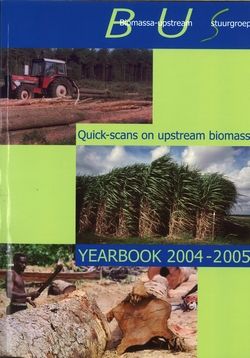BUS - yearbook 2004-2005
There is little doubt in the scientific and industrial community that biomass will play an important role in the transition towards a sustainable economy.
It will increasingly be a source of renewable energy, a raw material for the production of bio-chemicals and the basis for various construction materials. Inevitably, this will lead to an increased demand for biomass, which may surpass the current food-oriented biomass production by an order of magnitude. Entirely new economic chains will develop linking biomass production with final products on a truly global scale. Bringing supply and demand for biomass in some sort of balance is difficult enough. To achieve this in a sustainable way, will be a major challenge and many questions can be raised:
- Which crops are suitable for which purpose?
- Can we genetically modify crops to better suit the application?
- When is this ethically acceptable?
- Under which conditions can biomass be produced in an economically viable way?
- Will a steep increase in the demand for biomass in the “rich” countries cause over-exploitation in developing countries?
- How can we prevent negative impacts on biodiversity?
- How can biomass be certified as a sustainable raw material?
The Biomass Upstream Steering committee (BUS) has made an attempt in the past two years to develop insight in a broad spectrum of questions around the theme of production, supply and trade of biomass. With short studies (“quick-scans”), sometimes extended with a “follow-up”, many aspects have been studied and discussed. This yearbook is the compilation of these explorative studies. Through this yearbook we hope tot inform a broader audience about the activities of the BUS and thereby contribute to a more sustainable use of biomass.
auteur(s): Leen Kuiper (eds)
2006 | 246 pag. | ISBN 90 8755 001 4
prijs: uitverkocht
